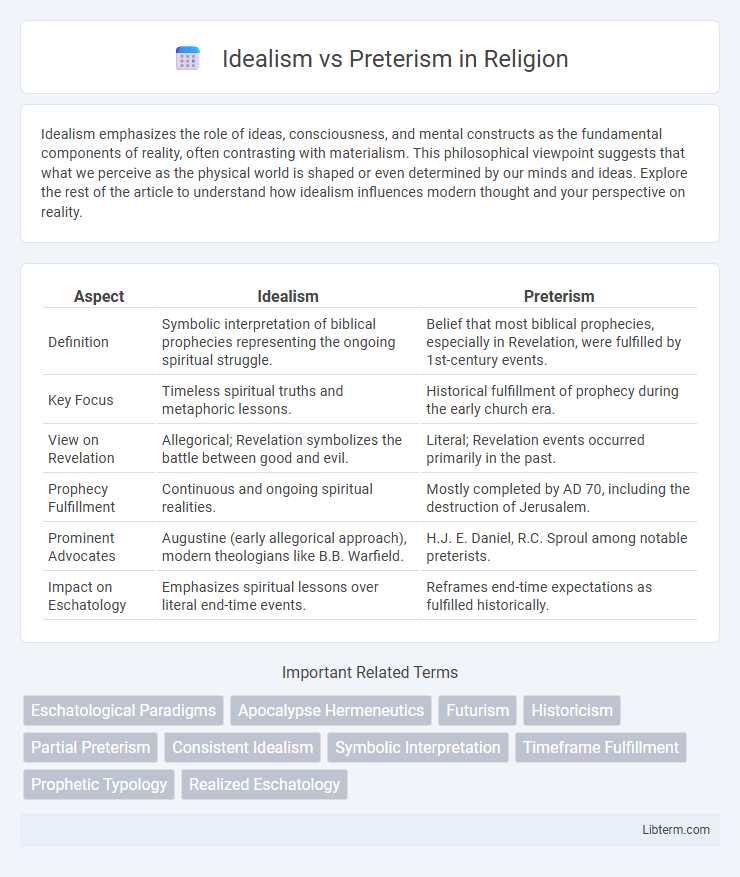Idealism emphasizes the role of ideas, consciousness, and mental constructs as the fundamental components of reality, often contrasting with materialism. This philosophical viewpoint suggests that what we perceive as the physical world is shaped or even determined by our minds and ideas. Explore the rest of the article to understand how idealism influences modern thought and your perspective on reality.
Table of Comparison
| Aspect | Idealism | Preterism |
|---|---|---|
| Definition | Symbolic interpretation of biblical prophecies representing the ongoing spiritual struggle. | Belief that most biblical prophecies, especially in Revelation, were fulfilled by 1st-century events. |
| Key Focus | Timeless spiritual truths and metaphoric lessons. | Historical fulfillment of prophecy during the early church era. |
| View on Revelation | Allegorical; Revelation symbolizes the battle between good and evil. | Literal; Revelation events occurred primarily in the past. |
| Prophecy Fulfillment | Continuous and ongoing spiritual realities. | Mostly completed by AD 70, including the destruction of Jerusalem. |
| Prominent Advocates | Augustine (early allegorical approach), modern theologians like B.B. Warfield. | H.J. E. Daniel, R.C. Sproul among notable preterists. |
| Impact on Eschatology | Emphasizes spiritual lessons over literal end-time events. | Reframes end-time expectations as fulfilled historically. |
Introduction to Idealism and Preterism
Idealism interprets biblical prophecies symbolically, emphasizing timeless spiritual truths rather than specific historical events, viewing the apocalypse as an ongoing struggle between good and evil. Preterism asserts that most prophetic events described in the Bible, particularly in the Book of Revelation, were fulfilled in the first century, especially through the destruction of Jerusalem in 70 AD. Both perspectives offer distinct approaches to eschatology, with Idealism focusing on enduring principles and Preterism grounding prophecy in historical reality.
Historical Origins of Idealism
Idealism originated in the medieval period, deeply rooted in the allegorical and spiritual interpretations of biblical prophecy, primarily advanced by theologians like Augustine of Hippo. This approach emphasizes symbolic and timeless spiritual meanings rather than literal historical events. Idealism contrasts with Preterism, which emerged later during the Reformation, focusing on the fulfillment of biblical prophecies in specific historical contexts.
Historical Origins of Preterism
Preterism originated in the early 17th century as a response to the challenges posed by historicist and futurist interpretations of biblical prophecy, emphasizing that many prophecies, especially those in the Book of Revelation, were fulfilled by events in the first century, such as the fall of Jerusalem in AD 70. This theological perspective emerged primarily within Roman Catholic and some Protestant circles, particularly among Jesuit scholars like Luis de Alcazar, who sought to interpret apocalyptic literature in a way that aligned with historical occurrences of their time. Unlike Idealism, which interprets prophecy symbolically and outside specific historical contexts, Preterism anchors prophetic fulfillment firmly in past historical events, marking a distinct approach in eschatological studies.
Core Beliefs of Idealism
Idealism interprets biblical prophecies as symbolic representations of the ongoing spiritual struggle between good and evil, rather than specific historical events. It emphasizes timeless moral lessons and the sovereignty of God over human history, rejecting a literal fulfillment of apocalyptic visions. This perspective contrasts with Preterism, which views many prophecies as already fulfilled in the past, particularly around the first century.
Core Beliefs of Preterism
Preterism centers on the belief that most biblical prophecies, particularly those in the Book of Revelation, were fulfilled by events in the first century AD, especially the destruction of Jerusalem in 70 AD. This view holds that prophecies about the end times relate primarily to the early Christian era rather than future apocalyptic events. Preterism contrasts with Idealism by emphasizing historical fulfillment over symbolic or timeless spiritual interpretations of prophecy.
Scriptural Interpretation: Idealism vs Preterism
Idealism interprets biblical prophecies symbolically, emphasizing timeless spiritual truths rather than historical events, aligning with a non-literal hermeneutic that views Revelation as an ongoing spiritual conflict. Preterism approaches Scripture through a historical lens, asserting that most prophecies, especially in Revelation, were fulfilled in the first century, particularly in relation to the fall of Jerusalem in AD 70. This contrast highlights Idealism's focus on universal spiritual principles versus Preterism's emphasis on specific, historically grounded fulfillments in New Testament eschatology.
Major Strengths of Idealism
Idealism interprets biblical prophecy as symbolic of the ongoing spiritual struggle, offering timeless relevance that applies across all historical periods. This approach emphasizes the moral and theological lessons of scripture, providing believers with practical insights and encouragement for living faithfully. Its flexibility allows for diverse application without being restricted to specific historical events, enhancing its appeal to a broad audience.
Major Strengths of Preterism
Preterism's major strength lies in its historical approach, interpreting biblical prophecies as events that predominantly occurred in the first century, which provides clear contextual grounding and coherence with historical records. This perspective allows for a tangible connection between scripture and known historical events, enhancing its credibility among scholars and believers who value factual consistency. Preterism also emphasizes the fulfillment of prophecy within the early Christian era, offering a focused framework that discourages speculative futurism and promotes a more immediate application of biblical teachings.
Key Criticisms and Controversies
Idealism faces criticism for its symbolic interpretation of biblical prophecies, which some argue diminishes historical specificity and predictive accuracy. Preterism is controversial for its claim that most prophecies were fulfilled by the first century, leading critics to question its relevance to future eschatological events. Both views spark debate over scriptural literalism and the timeline of divine fulfillment in Christian eschatology.
Contemporary Relevance and Influence
Idealism and Preterism shape contemporary eschatological discourse by offering contrasting interpretations of biblical prophecy that influence Christian theology and practice today. Idealism interprets prophetic events symbolically, addressing timeless spiritual truths applicable across eras, resonating with modern believers seeking moral guidance amid social change. Preterism, affirming many prophecies as fulfilled historically, particularly in the first century, provides a framework for understanding the Bible's relevance to early Christian communities and contemporary faith through a historical-critical lens.
Idealism Infographic

 libterm.com
libterm.com